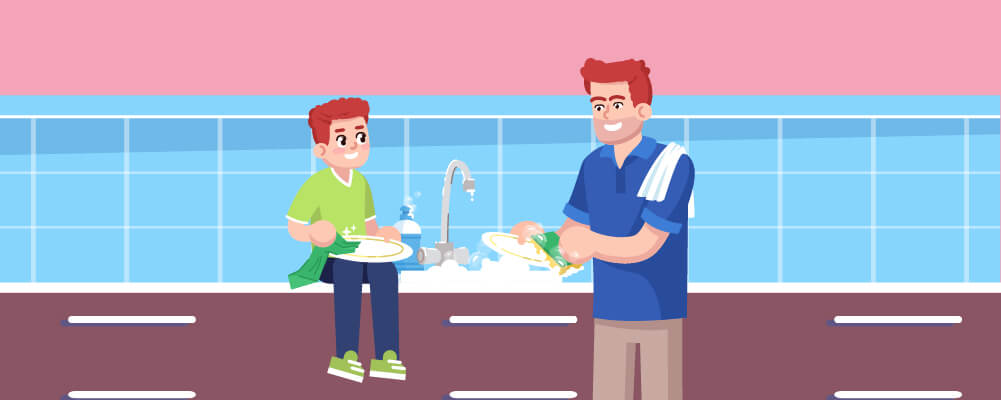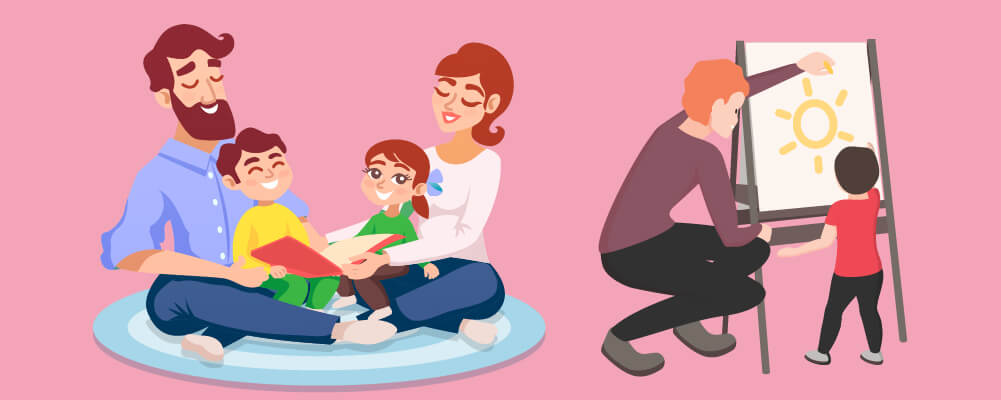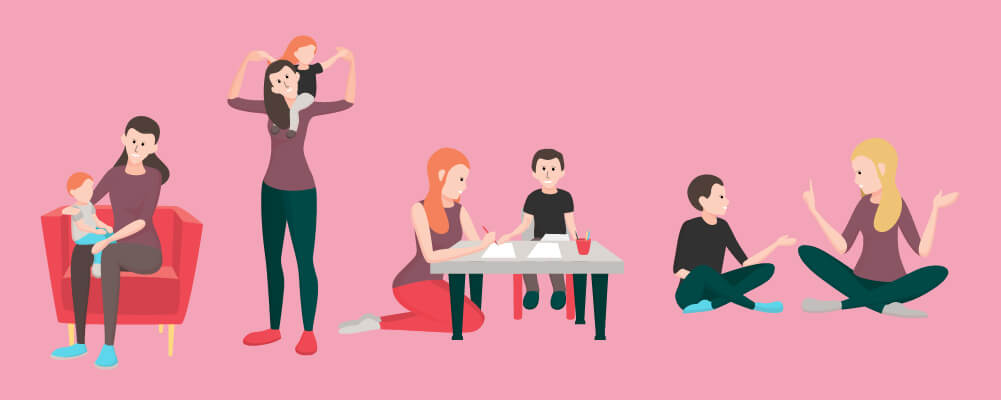Any parent, new or experienced, will tell you one thing – parenting isn’t easy! Getting it right can sometimes feel like a masterclass in patience, and can be rather frustrating at times. On the other hand, parenting is also very rewarding, especially when your child responds to what you are saying. It can almost make you teary-eyed to see just how far your little one has come!
Introduction

For first time parents, though, there are a lot of unknowns. What are the best ways to parent a child that are going to help them to turn into strong and well adjusted adults one day? For those of you confused like we once were, we’re here to give you all of the information on how to parent your child positively to give them the best upbringing possible. Without further ado, here’s everything you need to know about positive parenting.
Table of contents
What Is Positive Discipline?

The first thing to know about positive parenting is that positive discipline is key. Now, you may think that the words positive and discipline wouldn’t necessarily work together, but they actually go hand in hand.
When we think of discipline, we often think of unpleasantness – it’s not something that any parent likes to do, but it’s completely necessary when it comes to raising well adjusted children. Discipline doesn’t actually have to mean traditional methods of punishment like yelling at your children. Actually, it means the opposite.
Good Housekeeping outlines that there are five principles associated with Positive Discipline, but there’s one key takeaway – you’re being firm with your child while still being kind to them. Instead of punishing behaviors, you’re instead getting to the root of why it’s happening and finding a solution that works both for you and your child. It involves effective communication with your child and having respect for them, too.
Positive discipline consists of a number of different techniques that we will cover in more depth later on. It does not consist of things like smacking or shouting at children. It’s all about encouraging positive communication with your child when they misbehave, so they can correct the behavior going forward.
Why Is Discipline Important?

So, why exactly is discipline important? Why not just allow your child to run wild and do whatever they want? Well, discipline is important for a lot of different reasons, and it’s vital for your child’s wellbeing and long-term development. Here are a few of the reasons why discipline is so important.
Teaches your children responsible behavior and self-control
One of the most crucial things when it comes to parenting is teaching our children that what they do has a long term impact. The things that they do will affect not only themselves but also the people around them. Making your child aware of that is vital for their overall upbringing, and it will help them to understand right from wrong as they get older.
Not only that, but when you discipline your child you are also teaching them self control. We all want to be able to give our child everything that they want, and to allow them to do whatever it is that makes them happy, but there are some things that they simply cannot do. Teach them in a kind way not to put their hands in the plug sockets in the wall for their own safety, and they’ll realize that there are some things that they cannot do for their own safety. Your child will begin to learn as you discipline them that they need to control their urges and impulses, which is a vital life lesson.
On the other hand, positive discipline isn’t just about telling your children the things that they shouldn’t do. It’s also about telling them when they’re doing something right. It’s about rewarding them for good behavior so they’re more likely to repeat those good behaviors in the future. By practicing correct discipline, you are even strengthening your bond with your child as you are communicating in a healthy way.
The goal of discipline is to show how our children how to behave, instead of punishing them for misbehavior
Ultimately the main aim of disciplining your children is to ensure that they behave correctly in the future. Positive discipline is an effective way to do this, since it encourages good behavior and discourages bad behavior, but in a way that’s healthy and effective for both parent and child. It is the ideal parenting method for creating children that will grow up to know right from wrong, and be well adjusted.
What Happens When Children Lack Discipline
On the flip side, not disciplining your children can have some pretty bad effects. When your child isn’t disciplined, it can put them in danger since they aren’t going to know right from wrong. This may mean that they are more likely to do things that can get them in trouble or can get them hurt.
Undisciplined children can also be entitled, which is not the kind of attitude that should be encouraged in a child. They may be unwilling to listen when they are told ‘no’, and they may be unwilling to show empathy and kindness towards their peers. It can also harm your relationship with your child.
Ultimately, children that are well disciplined are significantly more likely to lead happy, healthy, and safe lives. Positive discipline is the best way to discipline your child, thanks to the reasons we have mentioned above.
Positive Discipline Strategies

Now that we have covered some of the key benefits of positive discipline, it’s time to explore how to do it. There are a number of different strategies that you can employ for positive parenting, but these are just some of the most vital ones.
Set limits
Let’s be honest – nobody really enjoys telling their kids what they can and can’t do, but it’s absolutely crucial for so many reasons. Setting limits with your children is one of the most fundamental aspects of positive parenting. If you have limits then it will allow you to be patient as a parent and do a better job, since you will feel that your child respects and listens to you. It strengthens your relationship with your child and creates a healthy power dynamic when it is done correctly.
It can often be difficult to know when it’s time to set a new boundary, but looking towards your own attitudes and behaviors can often tell you a lot. If a certain situation is starting to make you agitated or frustrated, it’s a good sign that it’s time to set some limits.
For instance, if your child demands to play immediately after dinner, then it may be time to set a boundary to say that you wait an hour after dinner if it’s frustrating you. Explain to your child why that boundary is needed, and what they get if they honor it.
Of course, setting limits can be tricky at first and can occasionally create a power struggle between parent and child. Don’t panic if this happens.
If your child is doing something that they shouldn’t be doing, describe the behavior that you are noticing, set the boundary and then offer an alternative – more on this later! Your child may still fail to obey you initially, so you need to have patience and work through the emotions that they are displaying in order to reach a solution. When setting limits, always remain calm and keep it simple. By overcomplicating the instruction, you risk confusing and frustrating your child.
When you set limits, you are teaching your child that you are a person with needs too. You are teaching your child that you need to meet your own needs in addition to theirs, and your child will be better for it since they will have empathy towards others who also have their own needs. It also helps to teach your child that it’s okay for them to set limits of their own too in order to look out for their needs.
Reward your child, when they are behaving
If you want your child to behave in a certain way then positive reinforcement is your ticket to success. All too often as parents we are prone to only focusing on the negative behaviors that our children display, but this isn’t the right way to do things. Sure, dealing with negative behaviors is important, but it’s also vital that you pay attention to the things that your little one is doing right, too. Children are very eager to please, especially when there are rewards involved, so they are more likely to do something if they feel that you are happy about them doing it.
For instance, if your child tries to help you to wash the plates, then tell them that they’re doing a great thing and being very responsible. They will appreciate that you have acknowledged the good thing they’re doing. Give them plenty of love and praise whenever they do something good, and they’re more likely to do it again.
Redirect bad behavior
Now here comes the trickier bit – redirecting the bad behavior. This can be somewhat complicated when you have a toddler that’s having a particularly nasty tantrum, and they’re struggling to listen. When you redirect behavior, what you are doing is you are taking the child’s bad behavior and replacing it with a positive behavior. Telling your child to stop the behavior may not work in the throes of a tantrum so redirection may help in these situations.
For instance, let’s say that your child is throwing hard objects across the room. This is a behavior that you may not want them to do. To redirect the behavior, you could encourage them to throw a ball back and forth to you. This is a more constructive behavior that helps their motor skills.
Again remember. When you are redirecting bad behavior, make sure that you are firm and consistent. Your child may not listen automatically, but with time they are sure to listen. You may sometimes need to be more flexible in your approach, so be prepared for that. Whatever you do though, don’t shout at your child – it may encourage them to get loud too. You are your child’s biggest role model, and they are likely to try to mimic your behaviors.
Show and tell
Your child learns from the behaviors of the people around them, especially while they are still young. For that reason, it’s really important that you are giving them the right examples. Show them the behaviors that you want from them and they are more likely to do them too. For instance, if you pick up your child’s toys, they will follow suit in the future to please you.
On the flip side, the opposite is also true. If you demonstrate negative behaviors then your child may try to copy or mimic you. If you swear, your child may try to swear. If you show aggression, your child may also show aggression. Show them the behaviors that you wish to see repeated.
If your child doesn’t understand why you’re doing something in particular, then explain the behavior to them so that they understand why they are doing it. Be calm in both your actions and words, and you are likely to see success in the long run.
Positive Discipline: Age By Age Guide

Parenting isn’t a one-size-fits-all approach. In fact, your approach to parenting is going to need to be adjusted as your child grows older. For instance, you wouldn’t parent your teen in the same way that you would parent your newborn, would you? As such, it’s important to understand how positive parenting is going to work at every stage of your child’s life. Here’s our age by age guide on positive parenting your child.
Infant
Let’s start off right at the beginning of your little one’s journey through life. Positive parenting for an infant doesn’t need to be something difficult – it’s usually just a case of listening to their needs and responding to their behavioral cues correctly.
The infancy stage is key in your child’s development, so things like encouraging communication and healthy boundaries are very important at this point. It’s all about teaching your child to listen and teaching them to ask for what they need.
The main thing to keep in mind is that the main way that your child will learn as an infant is through observation. Your child will watch the adults and older children that they are around on a regular basis and will mimic their behaviors. For this reason, it’s pretty vital to ensure that the behavior you are modeling is what you wish to see from your child. If you eat your dinner sensibly, your child is more likely to eat their dinner sensibly. The same goes for other behaviors.
Make sure that you are using the right language when giving your child commands too. Stay away from words like ‘don’t’ as they are more negative. Instead, tell your child that it’s ‘time’ to do something. Ultimately, just frame things in a more positive language that doesn’t sound like you are scolding them. You want to encourage your child, not make them fear you.
There is one exception to this rule. When your child is doing something that could be dangerous, you should then use the word ‘no’. If you use the word sparingly, your child is going to realize that the word has much more gravity when you use it. Of course, you should try to limit safety hazards so you can limit the amount that you have to say no. Redirect your child’s attention to something that they can play with instead, like one of their toys.
Finally, make sure that you ensure consistency. Your child isn’t always going to be with you – they will also spend time with their other parents, their family members and their childcare providers. You need to make sure that you are all on the same page about how your child must be disciplined, or they can end up getting confused, unwinding all of the progress that you have made.
Toddler
Now that your child is a little bit older, they’re starting to find their feet in the world a little more. If you raised them right in the infancy stage, your little one should now know their basic rights and wrongs. Of course, that doesn’t mean that raising a toddler through positive parenting is going to be easy. There are certainly plenty of challenges involved.
For starters, at this stage in your tot’s life, they may be more willing to try to push your boundaries. They want to know what they can and can’t get away with. Responding correctly to these behaviors is pivotal to getting the right behavior out of your toddler. As we’ve mentioned previously, this is the ideal time to praise your child for the behaviors that you want to see and to find ways to stop them from doing bad things by using redirection.
As you probably already know, the toddler stage contains something commonly known as the ‘terrible twos’. You know what that means – it’s tantrum time! Tantrums can be difficult to navigate and can be rather frustrating for you as a parent. Take a deep breath, and be prepared in advance for anything that may trigger a tantrum in your child. For instance, if your child tends to have a tantrum when they are hungry, make sure that you feed them in a timely manner to avoid the tantrum.
Your toddler may also exhibit aggressive behaviors at this point as they are trying to push your buttons. Make sure that you are discouraging this behavior and you are modeling peaceful attitudes and behaviors yourself. If your child sees you constantly fighting with your loved ones, they may be more likely to follow suit. If your child gets into a fight with another of your children, also make sure that you aren’t picking sides. There are ways to be neutral and still diffuse fights. Finally, remember our tip from the previous section – stay consistent in your discipline.
Preschool
Your child is a little older and wiser now, but that doesn’t mean that they have no more growing left to do! Preschoolers are often still learning what actions are right and wrong, and the kinds of effects that they are going to get from doing certain things. You should still be prepared for your child to try to push the buttons of everyone in your family at this point as they are navigating the effects of their actions.
This is a fantastic point in your child’s life to start teaching them some responsibility. It is a good time to begin giving them some chores around the house. For instance, when they pull all of their toys out, give them the duty of cleaning them up afterward. You can show them how it’s done in a way that’s easy for them to understand, and then praise them afterward.
Take the chance to let your child make decisions too – give them options and redirect them as needed. Ensure that they are learning about how they should and shouldn’t be treating those around them. They should be taught that while emotions are natural, acting on feelings like anger with violence is not okay, and they should channel their anger into more positive outlets. Encourage them to communicate with you. Make sure you are disciplining them as needed with things like time-outs or getting rid of the thing that’s causing the problem.
School-Aged
When your child gets to the point when they are in grade school, they are finally at a point where they are mostly understanding what’s right and what’s wrong. This can sometimes mean that they may find it challenging to make decisions, of course, since there are always nuances and these can sometimes be difficult for a child to navigate. Encourage dialogue with your child about the situations that they are in and allow them to make their own decision as you guide the way. This will help them to make decisions much more easily in the future.
Also, make sure that you lay some more ground rules about what may happen if they don’t follow the family limits and boundaries. Open them up to more responsibility like household chores, demonstrating that when they act responsibly they will get rewarded. Again, your child is still learning a lot from you too, so make sure that you are modeling the behaviors that you wish to see.
Adolescents and Beyond
Your child is almost all grown up and ready to embark on young adulthood, but there’s still one stage left. Through the adolescent and teenage phases, it’s all about providing the right level of guidance and freedom to your child. Your child is becoming more independent and making more of their own decisions. This does often mean that there’s more of a need for boundaries and expectations to be put in place though, as they may be tempted to rebel against you.
Your teen may be independent and a little distant at this stage, but that doesn’t mean that they don’t still need your love and support. Make sure that you are still giving them love and attention. Talk to them, ask how they are doing. This is a great time to develop your relationship with your child even further, and they will certainly thank you for it. It also encourages healthy relationships with others, including their peers.
Finally, make sure that you are paying attention to the things that your child is achieving and what they are struggling with. If they achieve something like getting good grades, reward them for it. Reward them when they choose to stay away from doing behaviors that you don’t want them to do. Model good behavior so they’re more likely to follow suit. Make sure that you are there to support them and give them advice and guidance when they need it.
Harsh Words Are Hurtful!

Now we’ve discussed positive parenting and the things that you should be doing, but what about the things that are best avoided? In the past, people were under the impression that physical punishment and harsh words were the best way to parent a child, but this is certainly no longer the case as we learn more about child development.
Never punish your child for bad behavior
When it comes to disciplining a child, physical or verbal punishment should never be the answer. We get it – children can sometimes be frustrating and sometimes it feels like you’re never going to get through to them, but you will with some patience and love. Children need to be nurtured, not scared into submission.
Physical punishment comes with a lot of downsides for your child. It can result in more aggression, physical injury, mental health issues, and antisocial behavior. When your child is physically punished, it simply makes them fear you. Your child will obey you, but it won’t be for the right reasons. Not only that, but punishment can quickly spiral into abusive behavior, which can be very damaging to a child’s mind. It will fracture your relationship with your child too, which is the last thing that any parent wants.
Ultimately, punishment is not the answer. Redirection and positive parenting are far more effective in getting your child to behave in a proper manner. Not only that, but it’s also a lot better at helping your child to foster a good relationship not only with you but with other people around them, too. If you have been punishing your child up until this point, it may be time to practice some positive parenting to turn things around.
Verbal abuse causes emotional pain and shame
Likewise, verbal punishment isn’t the answer either. Things like shouting at your child or insulting them when they do something wrong may get them to momentarily listen to you, but in the long run, it can cause a lot of damage. The most obvious is that it can sometimes result in self-esteem problems. It can be really bad for their mental health.
Not only that but if you respond to problems by shouting and saying hurtful things, your child is more likely to do the same when they’re frustrated or upset. This isn’t the kind of behavior that should be encouraged, especially in a growing being. Instead, show your child kindness and patience. Show them the behaviors that you want to see, and deter them in a positive way from the ones that you don’t want to see. When you get the hang of it, you will find this method much more effective in the long run.
Summary

Positive parenting is the way forward for parents looking to create children who are well adjusted and disciplined, without the need for old fashioned and harmful techniques like spanking and shouting. With positive parenting, your children can learn right from wrong, and learn how to trust their own judgment with the guidance of a patient parent. It’s not always easy at first – when is parenting ever easy, after all? With some time and practice though, you are sure to get demonstrable results.